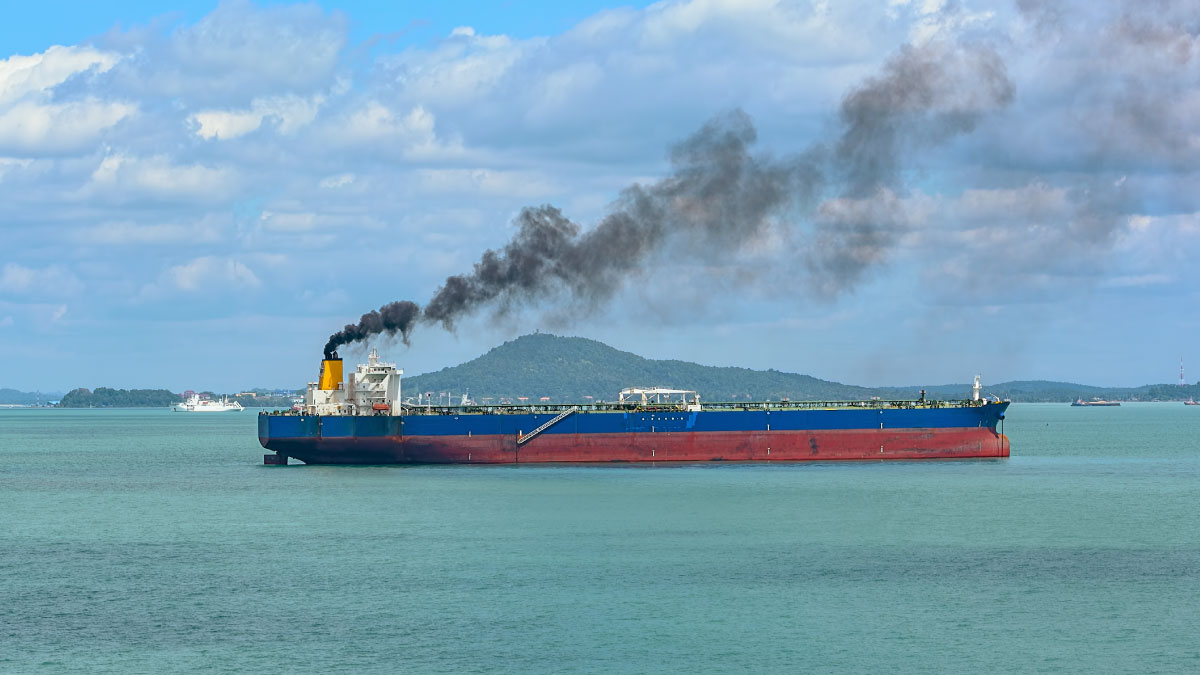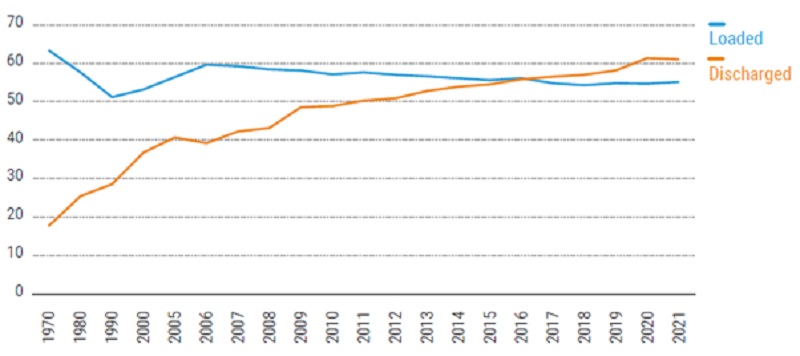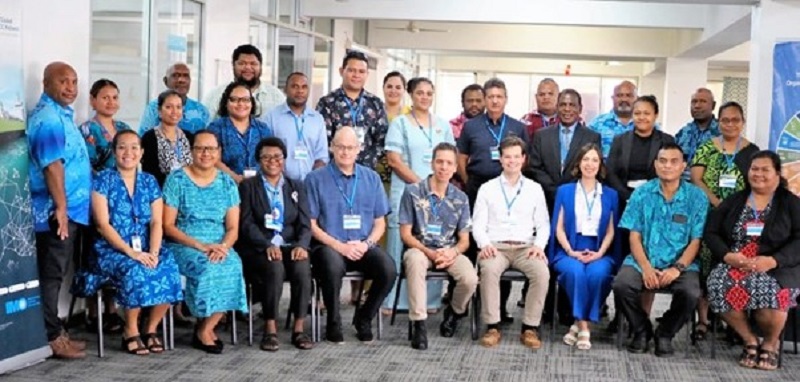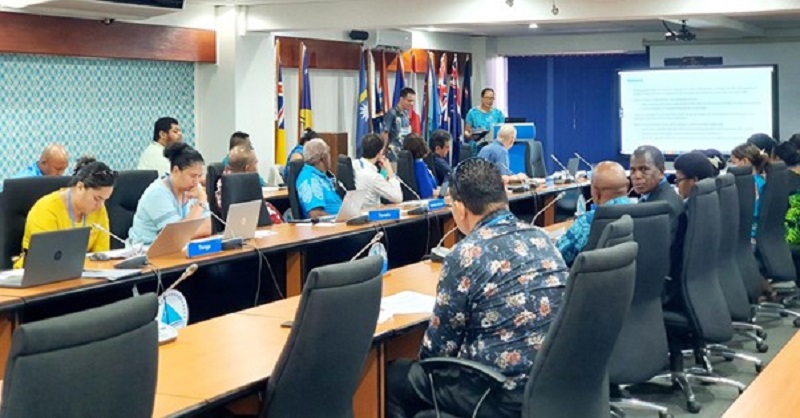Written by Aideé Saucedo Dávila, Camille Bourgeon, Onno Hoffmeister, Article No. 104 [UNCTAD Transport and Trade Facilitation Newsletter N°97 - First Quarter 2023]
© Shutterstock | Cargo ship with smoke exhaust
How improved data collection and management can facilitate future impact assessments of GHG reduction measures for international shipping
The ocean is essential for human livelihood because it regulates the climate and weather, supplies sources of nutrition, supports economies, shapes cultures, and provides sea routes that enable maritime transportation.
Maritime transport is an enabler of global trade and a driver of economic development and yet accounts for around 1 billion tonnes of greenhouse gas (GHG) emissions a year, equivalent to 2.89% of the total global anthropogenic emissions in 2018.
The International Maritime Organization (IMO) is a United Nations specialized agency mandated to set a global regulatory framework for safe, secure and efficient shipping on clean oceans. It has developed more than 50 international instruments, such as the International Convention for the Prevention of Pollution from Ships (MARPOL) which this year celebrates its fiftieth anniversary with the World Maritime Day theme "MARPOL at 50 – Our commitment goes on".
IMO has been considering actions to address GHG emissions from ships since 1997 with the adoption of MARPOL Annex VI and in 2018 adopted its first climate strategy. The eightieth session of the Marine Environment Protection Committee (MEPC 80) will adopt in July 2023 a Revised IMO GHG Strategy in all its elements, including with a strengthened level of ambition.
The Initial IMO GHG Strategy on reduction of GHG emissions from ships identifies the need to assess and take into account the possible impacts of measures on States, including developing countries, in particular, on least developed countries (LDCs) and small island developing States (SIDS), before adoption of the measure. The Strategy also contains a requirement to assess and address disproportionately negative impacts on States.
Developing countries, SIDS and LDCs play an important role in international maritime transport. According to UNCTAD (Figure 1), in 2021, ports located in developing countries accounted for 55% of the volume of global goods loaded (exports) and 61% of goods discharged (imports). Also, 96% of the fleet engaged in international shipping is flagged in developing countries including SIDS and LDCs. Developing countries’ engagement is crucial to achieve the IMO GHG Strategy and with relevant support, these countries can contribute significantly to maritime and port decarbonization.
Figure 1. Participation of developing countries in international maritime trade
(percentage share in total tonnage)
Assessing possible impacts on States
The reduction of GHG emissions from international shipping contributes to limiting climate change and achieving the goals of the Paris Agreement and the 2030 Agenda for Sustainable Development. However, the adoption of IMO GHG reduction measures may result in impacts on States specifically in terms of geographic remoteness, connectivity to main markets, cargo value and type, transport dependency, transport costs, food security, disaster response, cost-effectiveness and socio-economic progress and development.
There are different ways to assess impacts on States and research provides further insights on which factors, data sources and methodologies are fitted for assessing the above-mentioned list of possible impacts on States.
Soon after the Initial Strategy was adopted, IMO agreed on a dedicated procedure to assess those impacts.
Lack of historical and relevant data on SIDS and LDCs constitute a barrier to assess the direct and indirect impacts of candidate IMO GHG reduction measures, as pointed out in recent academic work. Impact assessments are key in the formulation of global policy measures to decarbonize international shipping at IMO as, for instance, research posits that the possible introduction maritime carbon pricing is expected to have a limited impact on average maritime transport costs but the likelihood of SIDS and LDCs experiencing an increase in maritime transport costs and import prices is higher than for the rest of the world.
New IMO project to improve availability of maritime transport costs data in the Pacific region in the context of shipping decarbonization
In 2020, MEPC 75 approved a short-term GHG reduction measure combining technical and operational requirements with a view to reducing the carbon intensity of operational shipping by at least 40% in 2030, compared with 2008 levels. Prior to its adoption, the Organization undertook a comprehensive assessment of its impacts on States. The UNCTAD Assessment of the Impact of the IMO Short-Term GHG Reduction Measure on States is available online. The full Comprehensive impact assessment is available on IMODOCS.
The comprehensive impact assessment suggested possible considerations for future impact assessments of mid- and long-term GHG reduction measures for shipping, in particular (1) to review and determine the availability, reliability, and level of granularity of data and identify main gaps relating to transport cost data pertaining to developing countries, in particular SIDS and LDCs; and (2) to identify capacity-building needs to improve impact assessments, including building the capacity of developing countries, in particular SIDS and LDCs to collect relevant data.
On this basis, the IMO Secretariat initiated in 2022, with funding provided by the IMO GHG TC-Trust Fund, a project aiming to improve the availability of maritime transport costs data for the Pacific region, with a view to facilitating future assessments of the possible impacts on States of potential GHG reduction measures in shipping including, as appropriate, carbon pricing instruments. The project is implemented by MTCC-Pacific, a centre of expertise established by IMO as part of the Global MTCC Network (GMN), and hosted by the Pacific Community (SPC) and the Secretariat of the Pacific Regional Environment Programme (SPREP). It has involved a number of field missions in participating countries to improve the access to transport cost data. Stakeholders from national statistics offices, port authorities, customs and maritime administrations are taking part in the project.
From 15 to 16 February 2023, IMO, UNCTAD, SPC and MTCC-Pacific held in Fiji a regional roundtable with 26 participants from 9 countries in the Pacific region to discuss the collection of maritime transport costs data at the national level and the sharing of lessons learned from the project so far.
Suva (Fiji), 15-16 February 2023
The roundtable proved useful to identity existing obstacles for the collection of the source data needed for good-quality statistics on maritime transport costs; among them, the lack of inter-agency coordination, limited awareness at strategic level, of the high need for maritime transport statistics and the limited number of skilled staff. Detailed outcomes of the roundtable will be submitted to MEPC 80.
Maritime transport costs are particularly important in the Pacific region, many of them, being small islands States, rely strongly on international trade for their economies, and most of that trade is necessarily maritime. Countries in special situations “often find themselves on the frontline of multiple crises, including climate change and the vagaries of international markets and trade”, as a recent UN report points out. This applies in particular to small island States in the developing world. One of the outcomes of the roundtable will be the publication of a guidebook on maritime transport costs data management, which will provide recommendations to collect such data in other regions facing transport costs data gaps.
Future steps and contribution to IMO’s work on decarbonization of international shipping
In 2022, IMO adopted a revised procedure for assessing impacts on States of candidate GHG reduction measures based on lessons learned from the comprehensive impact assessment of the short-term measure.
This revised procedure confirms the need for future impact assessments to include both an assessment of impacts on States based on a global modelling, with UNCTAD as a leading organization for this task, and complementary qualitative/quantitative stakeholders' analysis, including relevant illustrative case studies.
The qualitative/quantitative stakeholders' analysis should provide complementary modelling of possible impacts on States by further assessing possible negative impacts, in cases in which:
- the global modelling has identified a lack of data that impedes quantitative modelling of impacts on States;
- the assessed State is a small-scale economy with a low-connectivity index, in order to take into account import of essential goods, food security and/or disaster response, as appropriate; and
- the global modelling has identified high impacts compared to other States or regions, providing for a limited number of routes and commodities complementary modelling.
Data collected through the project will be used for assessing the possible impact on Pacific States of future IMO measures, thus supporting the Organization’s evidence-based decision-making process. Candidate measures being considered at IMO include low-carbon fuel standards, further technical requirements for ships and economic (carbon pricing) instruments, such as levies or reward systems. That way, a strengthened evidence base will pave the way for efficient measures to reduce GHG emissions from ships, taking care that States in specific conditions will not be left behind.
Authors:
Aideé Saucedo Dávila | Technical Officer | Marine Environment Division, IMO | [email protected]
Camille Bourgeon | Technical Officer | Marine Environment Division, IMO | [email protected]
Onno Hoffmeister | Chief, Statistics Production Unit | Statistics Service, UNCTAD | [email protected]





